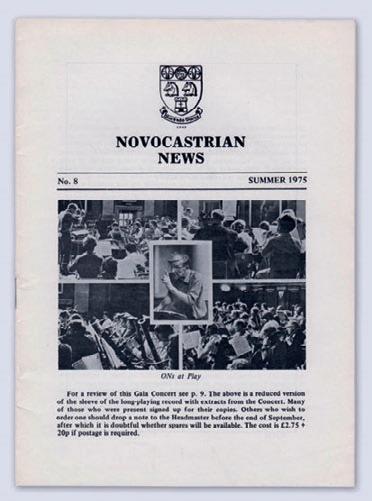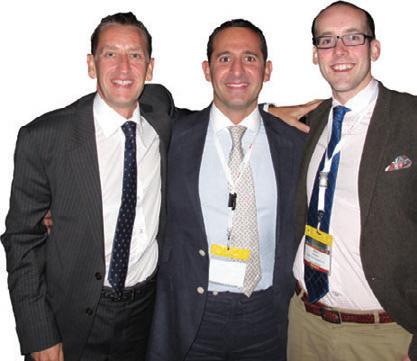
8 minute read
A History of the RGS in Ten People
from ONA 88
A HISTORY OFTHE RGS IN TEN PEOPLE
The search by David Goldwater (51-62) for 10 people who have been most influential in the history of the school continues.
Advertisement
The response to my request for ‘reader participation’ has produced an absolutely overwhelming response and it has given me a real problem how to progress (even conclude!) this series of articles. Because so many reminiscences concerned the influence and guidance given by Jack Wolstenholme, Director of Music from 1948 until 1975, this piece concentrates solely on him. Miss (Ma) Jean Steven, who filled hungry boys’ bellies from 1931 until the mid-50s will just have to stay in the Kitchen until the next magazine and maybe more ONs
Jack Wolstenholme, 1984. can send some recollections of her to the ONA development office (see Contents page for contact details). A picture would be very welcome. Is it too irreverent to imagine her on some ethereal plane, serving a delicious lunch to Jack and ordering him to “eat it up and don’t grouse”? As Orsino linked music and food in Twelfth Night, we will ‘play on’ – she and other iconic characters who colour the RGS’s historical kaleidoscope will have to wait. As I wrote previously, this will run and run! Stuart Armstrong (46-54) writes: I had been in the school for a couple of years when Jack arrived to replace Arthur Milner. I was in the Senior Choir under Mr Milner, and what a contrast in personality and styles! We wouldn't have dreamed of calling Mr Milner “Arthur” when discussing him, but we thought of his successor as ‘Jack’ from the first. Mr Milner was urbanity personified, whereas Jack was a ‘rough diamond’ –well bluff, but certainly a diamond. Let me pick out just a few of the highlights for me. While in his music class (and still a treble) I innocently asked him what “soprani castrati” were. I got the right answer, but with the gory details glossed over. Perhaps the orchestral repertoire was less adventurous. Jack inherited a strong tradition, including participation by some Masters, and regular opportunities for young instrumentalists to ‘star’ in a concerto, and he was glad to build on that. I was never a ‘star’, but got as far as Principal Second Violin.
There were limits to what was acceptable. Dennis Walton (44-52) went ahead despite a warning that a Jazz piece for clarinet as an entry in the House Music Competition wouldn’t be well received. He was duly awarded ‘nul points’. We knew Jack as a great character and a great asset to the school. None of us left our seats at the end of a City Hall Speech Day until he had finished his ‘tour de force’ on the large organ there, Widor’s Toccata. I’m so glad to have known him.
Mike Oswald (staff 1966-2003) remembers Jack Wolstenholme saying shortly after he retired: “The best thing about retirement is the free period after lunch!” I’m now in a position to concur!
Melvyn Wallhead (56-66): Jack collared me in the Hall, ‘inviting’ me to Saturday detention. He was affronted by me failing to answer any of his test questions correctly, except the identification of the National Anthem (I was learning the guitar at the time and at least I knew that). I think it was the first Speech Day at City Hall, in the 1960’s when Phantom of the Opera
was about, as it is today. Jack had on his gown and played a recital at the organ which was high up on the stage, and it reminded me of the film/musical for which he received enthusiastic applause.
Martin Forster (69-79): I must bring to your attention the last prize giving he attended before retirement. Prize giving was a duty rather than a pleasure but on this occasion as we stood up to rush off, Jack started to play a recital on the organ in the City Hall. The piece he chose was the Toccata from Symphony no. 5 by Widor and as this music started to fill the hall, everyone became rooted to the spot. Jack must have pulled out every stop on that organ, the whole building resonating. I never heard another organ recital so memorable.
W Roy Large (48-58): He demanded, and obtained, very high standards of performance from the school choirs, orchestras, and chamber groups. He was impatient of anything which detracted from the encouragement of music in the broadly classical tradition. I remember him furiously confiscating a piano accordion which a boy had taken to school and was caught unwisely playing it in the vicinity of the old music room. He inaugurated the ‘School Choir’ which sang an anthem every Friday at the morning service and in the 1960s he was invited to advise the Sarawak Government on the provision of music in education there and spent a term in that country.
Tom Banfield (51-62): I have sent across an old photo of Jack with some members of the First Orchestra, taken by the Evening Chronicle around December 1957. We were assembled in what was Room 2 at the bottom of the south stairs just before going onto the Hall platform to perform. Note the wooden desk with ink wells. Ball point pens had been introduced by a certain Mr Biro in the late 1940s, and I can still remember a school friend proudly bringing one of Mr Biro’s ball point pens to my primary school. I am the little sprog with buck teeth next to Jack. Next to me violinist Michael Smith (49-59) in glasses, then Alan McNaught (51-59), but the only other two I can confidently name are the young cellists Eric Ainslie (51-59) and Peter McManus (51-62). I think the
Jack Wolstenholme and puplis, 1957 sent in by Tom Banfield (51-62).
Stuart Armstrong (46-54)
Eric (Spike) Middleton (45-53) older cellist on the far right might have been called Robinson (?). I continue to play the violin. I am still in two orchestras and a string quartet on Teesside. Jack and the other staff (including my own teacher Johnson Hood, Jimmy Doull etc) gave us a tremendous start.
Eric (Spike) Middleton (45-53) ‘Jack’ has been an inspiration and encouragement to generations of young musicians at the RGS. Taking over from Arthur Milner in 1948, his dedication to creating the highest standards was seen in his conducting and training the First and Second Orchestras. Also memorable were his music lessons –just listening to the excitement of Bolero, the wonderfully evocative ‘l’apres midi d’un faune’ and many others. Infallibly cheerful, Jack was always seeking the best performances through rehearsing regularly with pupils and staff, in choirs and orchestras. He set up links with choirs from the Church High School, (e.g. the Coronation Concert, at the City Hall in 1952), Jack worked closely with instrumental teachers such as Johnson Hood, who taught violin and viola and ran chamber music concerts. Postscript: I, myself, as leader of the First Orchestra in ‘52/53 still enjoy playing in string quartets, and am in contact with other musicians of the year who have also kept on playing, Gordon Hewlett (48-54), Brian Oxley (43-51), Roger Watkins (45-
Jack Wolstenholme on the front cover of the Novocastrian News showing a reduced version of the sleeve of the LP record with extracts of the Gala Concert, summer 1975.

53), Ken Reid (46-54) and many others. We were encouraged to attend summer schools of orchestral music at Sherbourne School.
MR Barlow (53-64): My memory is of organ lessons in the Hall, when he would smoke whilst you played the latest piece, returning from the far end of the balcony, to demonstrate how it should be done. The lighted cigarette would be placed on the organ while he played, and picked up as he leapt off the stool for you to have a go. The burn marks are there to this day.
Brian Oxley (43-51) writes: It was a wonderful boost to our lives in so many ways. (Brian was Jack’s first Leader of the 1st Orchestra, for two years). “ Three or four exceptional teachers stand out from my RGS experience: Larry
Watson, Colin Hunter,
Jack Wolstenholme was the most important.”
Ian Duncalf (57-67) Ian Duncalf (57-67) I have a great many memories of Jack. I joined the RGS in 1957 in the Junior School; after moving away from the North East, my father’s job brought us back in 1961. I was 12, and joined the Third Form. Within my first half term I had joined the choir, singing the hymns at Assembly (a valuable grounding in itself) and Jack invited me to take part in the school’s performance of Brahms’ German Requiem in December 1961 (I still have the programme), including two Messiahs, and a wide range of other great choral works including the Fauré Requiem (I sang in the original concert that was recreated last year after the restoration of the organ).
50 years later I’m a veteran of the Royal Choral Society and the Philharmonia Chorus, and still very much involved in choral singing; without Jack, it might never have happened. Three or four exceptional teachers stand out from my RGS experience: Larry Watson, Colin Hunter, John Douglas; but given the large role that music has played in my life, Jack Wolstenholme was the most important. I remember him with great affection and gratitude, and I will be interested to see what others have to say about him.
For my part (David Goldwater (5162), I have been heartened by the extraordinary response from so many people whose lives Jack touched, professionally or otherwise. This piece could have been twice as long and the main problem has been what to include, and so a fuller article may appear on the ON website. Jack was a teacher whose enthusiasm spread even to those who didn’t play in any orchestra or sing in any choir. In 1984, there was a grand reunion of post-war pupils. The proceedings concluded in the Hall with recitals, music and finally, The School Song, sung unusually by boys, fathers, mothers, sisters et al. I waited by the organ near Room 14 for Jack to conclude the third and final verse and snapped him (see page 10) just as he turned with his quizzical grin – Triumphans!




